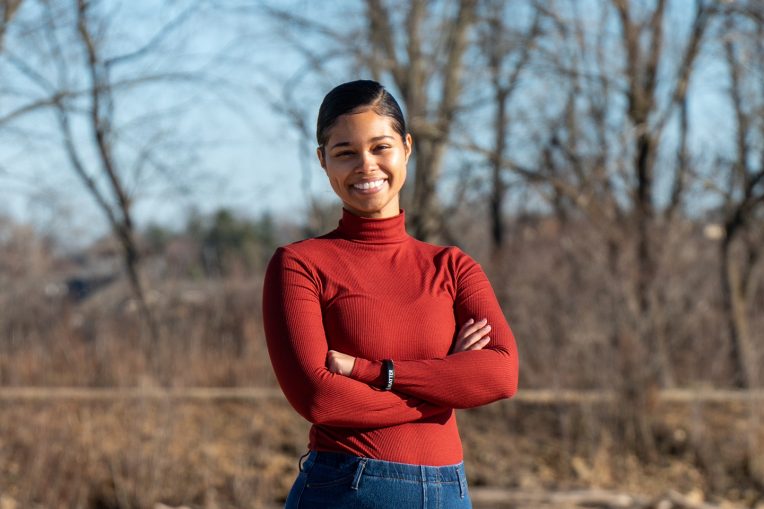This is the third story in a series in which students set to graduate in December reflect on how their final semesters at Illinois State University have been impacted by the coronavirus (COVID-19) pandemic.
Mahogany West started her first day of student teaching in an empty classroom. And that’s how she finished the semester, teaching middle school math and science students as they looked back at her from their kitchen tables.
It wasn’t easy for the December graduate, but she’s never taken the easy route. She was supposed to student teach in Texas, not in her hometown of Joliet. But a global pandemic changed those plans, and she returned home to live with family while teaching at John F. Kennedy Middle School in Plainfield.
West started at Illinois State in 2017 as a major in math education with a plan to teach high school students. She had received a Robert Noyce Teacher Scholarship, which is a $20,000 award for STEM teacher education majors.
“That was my golden ticket,” she said. “But unfortunately things didn’t go as I hoped the first year,” she said. Something wasn’t right. She went to see Gary Higham, lead placement coordinator for the Secondary Education and Professional Development Schools (PDS) Program.
“I told him, ‘I’m not sure this is my route. I was crying because I missed my seventh- and eighth-graders so much.”
He helped her change to middle level education, which took her an extra year, but put her back in the classrooms she missed.
“He’s had the biggest impact on why I’ve done so well,” she said. “I feel like I’ve found my place and my people and I wouldn’t change it for the world.”
West worked 30 hours a week in part-time jobs. One of those was with the Boys and Girls Club. She brought the children to campus twice a week to teach them indoor soccer. She was also active with the Black Student Union (BSU).
“There’s not a lot of people who look like me in teaching fields or STEM,” she said. “BSU worked toward advancing equity, and I wanted to be a part of that.”
Before applying for teaching positions, she’s going to take a little time to recover from all that has happened in 2020.
“I want to take some time to unwind and reflect,” she said. “I spent most of my time in my room teaching or studying. I haven’t had much time to be present with my family and I want to be as present as possible.”
This final semester was difficult, as she moved from an empty classroom to teaching from her bedroom when schools closed in November. But the support of her co-teachers helped, and she found the struggle was universal.
“Sometimes I had to talk to myself and dig deep down,” she said. “What has been so humbling is tenured teachers are also struggling so I know I can be easier on myself.”
One of her teachers compared the challenging learning environment to juggling balls, with some glass, some plastic.
“She said if you drop one that’s glass, there’s a big consequence. If it’s plastic, it’s not that big of a deal. I try not to be too hard on myself. I try and do the three most important things I have to do each day.”
What she’s missed most is connecting with students in person.
“I am teaching them and they’re learning, but knowing you will never see them the entire year, it’s definitely sad. It’s crazy to think I’ll never get to see them in person, or give them a high-five.”
Navigating new experiences is something she’s been intentional about. Before the pandemic, she grew in confidence by traveling solo through major cities and Europe, including Italy and Croatia.
“Being in a place where you don’t know where things are, where you don’t know the language, you have to advocate for yourself. That has made me more outspoken, and I teach that to students, how to get what you need by speaking up. I always let them know if things are getting tough, if you’re getting overwhelmed in other classes or things at home, let me know. I will be your biggest advocate.”
For information about commencement, visit the Graduation Services website.

